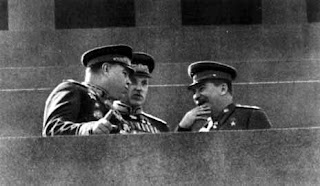 |
| General Sosnkowski |
Today Squadron 1586 is flying two Halifax and one Liberator flew to Warsaw with desperately needed supplies. There is no confirmation by AK units on the ground that supplies were retrieved. The pilots have reported that the city of Warsaw is on fire, making it next to impossible to find the find drop zones. Visibility is close to nil as planes had to fly through thick clouds of smoke. Air drops had to be made at very low altitude putting the planes at great risk of being shot down by German anti-aircraft fire. Meanwhile insurgents attempted to destroy a German armoured train but failed. Heavy German artillery fire has destroyed Polish strongholds in Wola, Old Town and Zoliborz. The Old Town district of Warsaw is under heavy fire from every direction and major fires have been set by the Germans destroying many historic buildings. But by evening the Germans have retreated to their original positions.
 |
| German Flakvierling 38 anti-aircraft gun Warsaw Uprising |
 |
| German tank enters Wola suburb of Warsaw |
 |
| German Brennkommando set fire to buildings in Warsaw |
The radio station "Błyskawica" began broadcasting today. Its first message was spoken by Zbigniew Swietochowski in which he said,"Hallo, here is Blyskawica speaking! A radio transmitter of the Home Army in Warsaw, on 32.8 and 52.1 meter bands. The spirit of Warsaw is wonderful. The women of Warsaw are wonderful. They are everywhere, in the front line together with soldiers as nurses or liaison officers. Even children are animated by a wonderful spirit of bravery. We greet all freedom-loving people of the world! Polish soldiers who fight in Italy, Polish pilots and mariners." The radio station is located in the building of PKO (Pocztowa Kasa Oszczędności), that is the Postal Savings Bank on 9 Jasna Street. The transmitter was constructed by Antoni Zebik pseudonym "Biegly". Its signal is the melody of Warszawianka. General Bor, Monter and other AK officers have sent a radio message to Soviet Marshal Konstantin Rokossovsky's headquarters asking for assistance. As yet there is no reply.
Warszawianka (00:02:00m)
 Rokossovky was born in Warsaw when it was part of the Russian Empire. His family comes from the szlachta, that is, Polish nobility - and a long line of cavalry officers. His father was inspector of the Warsaw Railways and his Russian mother had been a teacher. Rokossovsky was orphaned at the age of 14. During the First World War, he had volunteered to enlist in the Russian Army.
A famous incident occurred between Rokossovsky and Stalin during the planning of Operation Bagration. From June 22, 1944 to August 19, 1944 Soviet forces were engaged in the mission to clear German forces from Belorussian SSR and Eastern Poland.
Rokossovky was born in Warsaw when it was part of the Russian Empire. His family comes from the szlachta, that is, Polish nobility - and a long line of cavalry officers. His father was inspector of the Warsaw Railways and his Russian mother had been a teacher. Rokossovsky was orphaned at the age of 14. During the First World War, he had volunteered to enlist in the Russian Army.
A famous incident occurred between Rokossovsky and Stalin during the planning of Operation Bagration. From June 22, 1944 to August 19, 1944 Soviet forces were engaged in the mission to clear German forces from Belorussian SSR and Eastern Poland.
During the planning stages Rokossovsky had disagreed with Stalin, a move that was considered by many as suicidal. Despite pressure from Stalin to "go and think it over" Rokossovsky refused to cave in and insisted on "two break-throughs, Comrade Stalin, two break-throughs." After a third attempt, Stalin remained silent, walked over to Rokossovsky and put a hand on his shoulder. There was considerable tension in the room as everyone expected Stalin would rip off the epaulettes from Rokossovky's uniform. Uncharacteristically, Stalin supported his decision, and appeared visibly impressed with Rokossovsky's sound judgement. Stalin gave the order to attack according to Rokossovsky's plan. The battle was succesful. Rokossovsky's armies are now making their way towards Warsaw.
Warszawianka (00:02:00m)
 Rokossovky was born in Warsaw when it was part of the Russian Empire. His family comes from the szlachta, that is, Polish nobility - and a long line of cavalry officers. His father was inspector of the Warsaw Railways and his Russian mother had been a teacher. Rokossovsky was orphaned at the age of 14. During the First World War, he had volunteered to enlist in the Russian Army.
Rokossovky was born in Warsaw when it was part of the Russian Empire. His family comes from the szlachta, that is, Polish nobility - and a long line of cavalry officers. His father was inspector of the Warsaw Railways and his Russian mother had been a teacher. Rokossovsky was orphaned at the age of 14. During the First World War, he had volunteered to enlist in the Russian Army. |
| Stalin,Vasilevsky and Rokossovsky |
During the planning stages Rokossovsky had disagreed with Stalin, a move that was considered by many as suicidal. Despite pressure from Stalin to "go and think it over" Rokossovsky refused to cave in and insisted on "two break-throughs, Comrade Stalin, two break-throughs." After a third attempt, Stalin remained silent, walked over to Rokossovsky and put a hand on his shoulder. There was considerable tension in the room as everyone expected Stalin would rip off the epaulettes from Rokossovky's uniform. Uncharacteristically, Stalin supported his decision, and appeared visibly impressed with Rokossovsky's sound judgement. Stalin gave the order to attack according to Rokossovsky's plan. The battle was succesful. Rokossovsky's armies are now making their way towards Warsaw.

No comments:
Post a Comment